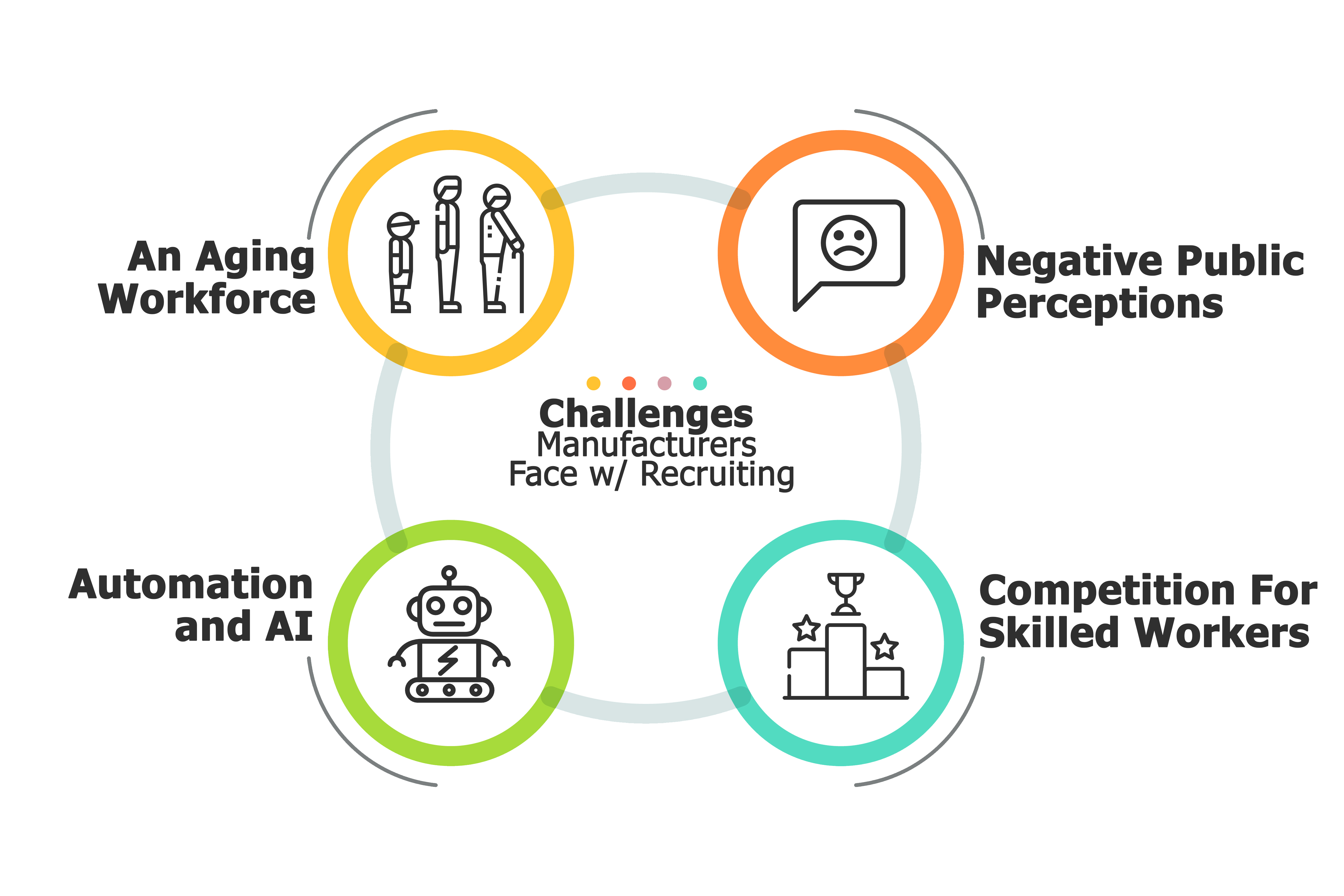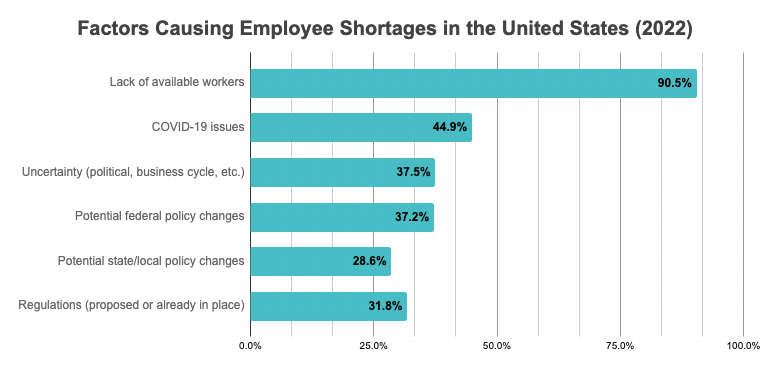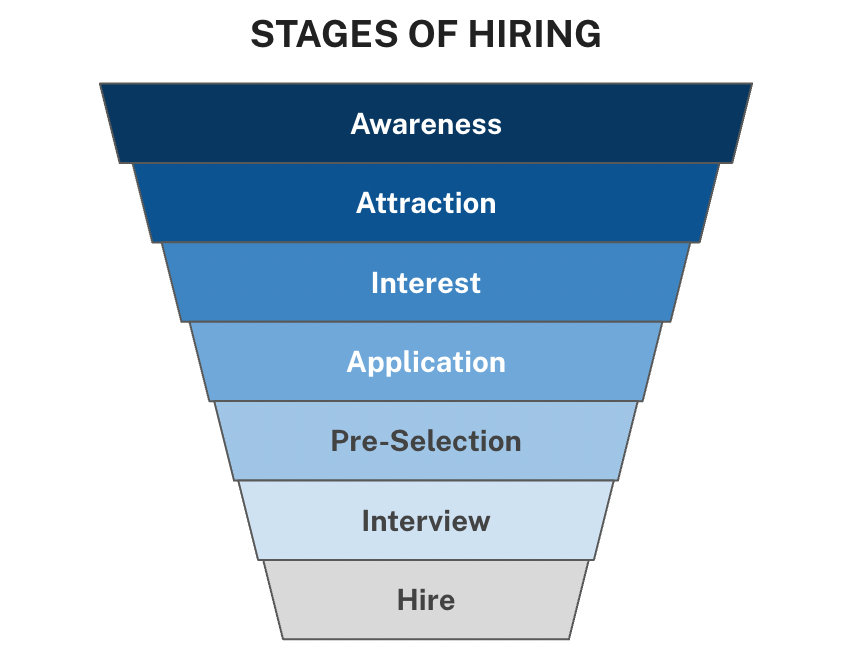
Podcast
26 min read
How To Hire the Best Employees for Manufacturing

Employees are the backbone of any company. Nowhere is this more true than the manufacturing industry.
Statistics show there are 15.7 million employees in the manufacturing sector in the United States, accounting for 10% of the total workforce. But employment levels have been on a downturn over the last decade, and 89% of manufacturing executives believe there's a shortage in the industry.
The numbers show there is a growing number of job openings in this sector, especially in the wake of Covid-19.
Hiring employees in manufacturing has its share of challenges. When companies in this sector seek to hire, they are often looking for skilled workers for highly specialized positions.
And with the turn toward technology and automation being used to streamline processes within manufacturing plants, the need for highly skilled and educated workers is only increasing.
So how does a company that focuses on manufacturing and production sway potential job seekers?
This article will seek to help companies learn strategies to boost their new hire rates and discuss how to find the best employees for manufacturing positions.
Challenges Manufacturers Face with Recruiting

There are several reasons why the manufacturing industry struggles to find potential candidates.
Knowing what these challenges are can help hiring managers combat them and increase the number of valuable candidates in the job pool.
Here's a list of some of the top struggles companies face when trying to find the best employees for open manufacturing positions.
An Aging Workforce
One of the biggest contributors to why manufacturing companies are facing a worker shortage is the number of current employees who are nearing retirement age.
Workers who have held positions for a long time are vacating those spots. Many younger people in the job market are leaning toward more tech-friendly positions and may believe factory work isn't the kind of job they want.
Companies need to cater to younger applicants and demonstrate how manufacturing positions can fit their lifestyles.
Negative Public Perceptions
People who might make great candidates shy away from manufacturing jobs because they believe them to be boring, repetitive, factory work.
Or they worry that an increase in outsourcing overseas and the likelihood of automation becoming more prevalent in the industry means a lack of job security.
Women and minorities are much less likely to apply for manufacturing positions based on some of these perceptions. Companies need to make a conscious effort to shift those perceptions.
Automation and AI
Part of the negative public perception tied to the manufacturing industry has to do with the increase in the use of advanced technologies, automation, and AI on the factory floor.
Studies estimate that 400,000 jobs were lost in U.S. factories between 1990 and 2007 as a result of automation, and experts believe another 2 million could be at risk before 2025.
Companies must embrace new technology to streamline their processes and gain efficiency, but they must maintain a balance and ensure potential candidates understand that automation creates different opportunities within the manufacturing sector.
Competition For Skilled Workers
Many manufacturing positions require a specific skill set, and the problem for many companies looking to hire is a global shortage of skilled workers.
With so many open positions across the industry, and not enough young people choosing to enter the workforce and learn the skills needed to succeed, there is stiff competition between manufacturing companies.
This means employers need to focus on methods to upskill employees and provide on-the-job training programs for new hires.

Strategies for Hiring the Best Employees for Manufacturing
With a "blue-collar shortage" that doesn't seem to be going away, and a global worker shortage resulting from the economic effects of the covid-19 pandemic, employers must rethink how they recruit new employees.
Hiring and recruitment strategies must reflect the rise of applicants using virtual means as a tool to search for work.
On top of harnessing the power of social media and the internet, employers must take a fresh look at traditional recruitment methods to ensure they’re making the most of every avenue available to them for sourcing candidates.
Every possible method for communicating open job positions should be utilized, but must be used efficiently to ensure time and money are not being wasted on outdated or ineffective techniques.
Below are some tips and methods employers should take advantage of when retooling their recruitment methods.
1. Market Your Roles Well
If companies expect to find candidates to fill open positions, they must market those jobs effectively.
There are numerous ways to get the word out that your company is hiring, and in this advanced age of technology, the methods available are only increasing in volume.
Here are some ways to market openings and ensure you hire the best employees for manufacturing positions.
- Social Media – These sites, especially Facebook and LinkedIn, are invaluable tools for companies looking to advertise job postings.
Companies can create a profile and gain access to tools designed specifically for employers, including the ability to link directly to a company’s career page on their official website.
- Job Boards – Any employer looking to seriously source candidates cannot overlook the value of online job boards. Google itself has a job search box, and companies can pay a fee to show up directly in the search results.
Glassdoor, Indeed, and Monster are also very popular. Don’t overlook the value of local job boards too.
- Company Website – Any company that is serious about recruiting candidates needs a website with a dedicated career page. Social media posts and job board listings can link directly to this page to drive traffic.
A career page offers employers the opportunity to outline company values through photos, videos, and employee testimonials. Be sure to include information on open positions, and how to apply. And always make sure the application and site are both mobile-friendly.
- Local Advertising – Traditional advertising methods are a great way to drive local traffic to your company. Even a now-hiring sign can pique the interest of people passing by.
Billboards are a great way to increase visibility to a large number of people. Local radio or television ads can also get information out there. - Ad Campaigns and Paid Media – Paid search or pay-per-click ad campaigns give companies the chance to get their information in front of a constant stream of internet browsers.
This process can be complicated for those who don't have a lot of experience, and companies should target this approach to ensure their desired audience will get the message before investing. - Community Partners – High schools, colleges, and universities may have events or programs where companies can be hosted to help students learn about employment opportunities.
This method has a proven success record, and over 70% of employers work with schools and organizations in their communities to field potential candidates. Companies can also partner with local governments to take advantage of economic development programs and job fairs.
2. Employee Referrals: Get Current Employees on Board

One of a company's best sources for potential candidates is current employees, who already know how a company runs.
Employee referrals are one of the most guaranteed methods for finding successful candidates to fill open positions, and employees hired through this method are more likely to stay on after hiring.
For companies to implement a great referral program, current employees need to be engaged. There are a few ways companies can ensure participation in the process and get a positive result to help hire the best employees for manufacturing through referrals.
Companies should build employee referrals into their culture. A great way to do this is by including mention of the importance of referrals during the onboarding process.
Giving new employees information on how and why they should participate in referring candidates during their training lets them know it’s encouraged and expected.
A great way to drive participation from current employees is to offer some form of incentive for referring potential candidates. Cash awards are always a good driver, but companies could also offer non-cash incentives, like event tickets, gift cards, or extra paid vacation days.
Get creative and poll employees to find out what would be an exciting reward. Or create some competition by sharing results or having inter-department contests to see who can refer the most candidates.
3. Offer the Best Benefits
In today's economic environment, job seekers are looking for more than a paycheck.
Companies that offer a comprehensive benefits package have a much greater chance of attracting potential workers, and many people actively looking for employment won't even consider a job offer that doesn't come with health insurance.
To attract the best employees for the manufacturing industry, employers should make sure their offerings are top-notch.
- Health and Wellness Packages – Giving employees a choice of great health insurance plans is key, but companies could also offer dental, vision, life, short-term, and long-term disability insurance, and accidental death and dismemberment coverage.
There's also the option of a health savings account and flexible spending accounts to help employees lower their taxable income.
- Retirement and Financial Planning – A retirement plan that offers company matching up to a certain percentage helps employees save for the future while they're still able to work. Companies can also offer pension plans or stock options as a great benefit for workers.
- Vacation and Sick Leave – Offering employees paid time off for vacation or sick days is a great incentive, and lets employees know that you value their hard work. It can also help lower the risk of burnout.
- Flexible Scheduling – Remote work has become more popular since the Covid-19 pandemic, and many job seekers look for this type of flexible scheduling option when considering job positions.
Employers should consider offering part-time or full-time remote work for non-production positions. It will make workers happier and save the company money on office expenses.
- Education and skills development – A job that offers the chance for continuing education is a great perk to offer employees, and 33% of younger workers say that opportunities for career advancement are one of the most important factors they consider during a job search.
This could be in the form of tuition reimbursement or discounts, job training, or on-the-job programs aimed at developing skills.
- Salary – Although not an actual benefit, salary is one of the first things potential employees will consider when looking at a position with a company.
Since the competition for new employees is so fierce in the manufacturing industry, potential and even current employees might consider jumping companies for even a small difference in salary.
- Other Perks – Companies should get creative when offering benefits to employees and not limit themselves to the basics like health insurance and retirement funds.
Younger employees expect more from their employers. Things like offering free lunches, discounts on daily expenses like cell phones and travel, and gym memberships are common offerings that give employees the impression that their time and hard work are truly valued.
4. Streamline the Application Process

Once a potential candidate decides to apply for a position with your company, they must make it through the application process.
Studies show that over 30% of applicants won't bother to apply if the process takes longer than 15 minutes. That's why employers need to revisit and revamp their application process.
Having a streamlined process will help companies find the best employees for manufacturing instead of scaring them away with lengthy and outdated applications.
- Simplicity – Make sure applications gather the basic information and avoid adding too many lengthy and redundant questions. Employees should be given a clear and easy-to-follow path during the application process.
- Utilize Technology – Using a mobile-friendly application is key to making sure candidates can follow through with the process. Users are much more likely to abandon an application if they can’t complete it accurately on a mobile device.
Companies should also take advantage of self-filling forms, which can link directly to a user's social media sites and fill in basic information gleaned from their profiles.
- Use an Applicant Tracking System – Applicant Tracking Systems (or ATS) automate the process of tracking applicants, storing information, and tracking their progress through the system.
This also allows employers to set some pre-interview questions that will easily screen out unqualified applicants without human intervention.
- Be Flexible – With advancements in technology and the increase in virtual interviews since the Covid-19 pandemic, more people have gained a level of comfort with using applications like Zoom and Skype.
Utilizing a simple application process and then saving the more detailed questions for a virtual interview lets candidates know your company is on the cutting edge of technology.
5. Maintain a Good Digital Presence
There’s no doubt that modern job searches start online, 64% of candidates research a company online before deciding to apply for a position.
Maintaining a strong online presence is vital for companies competing for candidates in today’s digital environment. So where does this online research lead people when they search the internet for a company?
The answer is mostly to online job boards like Glassdoor and Indeed. These sites not only list job openings, but they allow users the opportunity to leave reviews about anything from the application, to the interview process, and even reviews from current or past employees.
This creates a sense of transparency that workers expect today, but it can be a potential problem.
If companies don’t take the time and effort to effectively manage their online presence, they will struggle to find the best employees for manufacturing.
- Respond to Reviews – According to Glassdoor, 65% of candidates view a company more favorably when they personally respond to online reviews.
Companies should make an extra effort to respond to any negative reviews with explanations of what actions it is taking to rectify issues. It also gives them a space to correct information that is false or misleading, but this should be done with a large measure of tact so as not to alienate those reading the response.
- Delegate Responses – Companies should make sure there are designated hiring managers or HR executives with the authority to respond to reviews.
These employees should receive training and guidance on how to respond appropriately, and even given template responses to ensure a common voice is used across the board. - Own Your Pages – Most social media and job sites allow employers to claim a business's profile as their own. And this could not be more important, because that's what allows employers to personally respond to reviews.
It also helps if there are businesses with similar names so that people don't confuse your business with someone else's.
6. Look Over Your Job Descriptions
The job description is the first stop for most job seekers, so companies need to ensure the correct language and format are used throughout. A good job description can sway a candidate to apply, while a bad one can send them looking elsewhere very quickly.
Here are some tips for writing a great job description that will help companies find the best employees for manufacturing.
- The Title – The job title itself is what will rank on search engines when people are looking for a job, so make sure it uses clear and concise language that relates directly to the job itself.
Avoid using company lingo or terms that the public might not be aware of, and focus instead on the most generally accepted terminology when listing a position.
- The Intro – The very beginning of a job description should give the candidate a clear idea of the company culture, allowing them to imagine how they would fit in.
- Details, Details, Details – Job listings should be specific about the job requirements, including any skills that are necessary for applicants to be successful.
Use bullet points and lists to make scanning and comprehension easy. Try to avoid listing too many skills that employees will learn on the job, as this may scare away potential candidates who believe they may not be qualified.
- List the Benefits – If the position offers a benefits package make sure to note it in the body of the description.
Any positive that could sway a candidate to apply should be included, and some people won't even bother applying if these benefits are not available.
- Check for Errors – Since the job description is the first thing many candidates will see it must be a positive reflection of the company itself. Grammatical errors, programming faults, and glitchy programming on company websites are an absolute turn-off for job seekers.
- Avoid Superlatives and Bias – Job descriptions should be concise and direct. The manufacturing industry already faces a negative perception from women and minorities, so avoid using any language which could be misinterpreted to include gender or racial bias.
7. Consider a Hiring Agency
For companies that don’t have the time or people power for recruitment, a hiring agency is a great way to find potential candidates who will make the best employees for the manufacturing sector.
A hiring agency takes a lot of the leg work off the company itself and can be a great resource for companies that need to hire many employees quickly.
Hiring a staffing agency can help employers find qualified and even highly skilled employees without the company having to spend time and resources on performing the work themselves.
There are a variety of options available for companies to choose from when selecting a staffing agency. Some will provide temporary workers and others will hire employees on a temp-to-hire basis.
Hiring agencies are experts when it comes to recruitment, and companies can provide them with details on what type of employees they are seeking, including necessary skillsets, degrees, or technical training.
The great part about utilizing a temp-to-hire structure is that it allows companies to observe how an employee performs before offering them a permanent position with the company. This allows both employer and employee to get a feel for how they fit together before making an official offer of employment.
Utilizing a hiring agency can save employers money in the long run, especially when they need to fill many positions or need employees on a temporary basis.
Most hiring agencies take on the cost of performing pre-employment testing, background checks, and drug screenings for candidates before they ever submit them for a position.
Characteristics of a Good Manufacturing Employee

We've covered the basics of how to source and engage potential candidates during recruitment, and the many ways employers can get their job listings in front of the right audience.
But what about the qualities and characteristics of those employees? Companies should have a clear idea of what to look for in candidates to ensure they can find the best employees for a manufacturing company.
Below is a list of some qualities employers should look for in a potential hire.
- Ambition – Employers should look to hire people who have the ambition to excel and not just get by.
Hiring employees who have a desire to climb the ranks, perform successfully, and better themselves through a position is essential for companies who wish to retain those employees long-term.
- Attention to Detail – Manufacturing is an intensive industry, and employees often work with large machinery that can be extremely dangerous when not handled safely and correctly.
Employees should show an attention to detail that lets employers know they will maintain that level of precision on the plant floor.
- Dependability – Dependability is a trait every employee should have, but in the manufacturing industry, it becomes even more important.
Employees who are consistently late or absent can leave gaps in the production line and cause a company to lose money because of a lack of productivity.
- Critical Thinking Skills – Working close to potentially dangerous environments and equipment means that employees need to think fast when it comes to problem-solving.
Employees with the ability to react quickly and correctly under stress can prevent problems from escalating by identifying and dealing with issues as they arise.
- Independence – Companies should seek to hire employees who can learn a task and then perform it correctly without too much supervision.
Employees who have the confidence and skill to work independently can take pressure off supervisors and floor managers and free them up to direct their attention where it’s needed most.
- Ability to Learn – Manufacturing companies need employees who have the ability and desire to learn more than one role within the company.
This means that workers can learn new skills and be promoted to positions with more responsibility and allows employers to shift workers around to fill gaps in production due to illness or vacation time.
Final Thoughts
Manufacturing companies need employees to be successful, and the current labor environment has created unique challenges related to recruitment.
Companies need to be proactive and dedicated when it comes to sourcing potential candidates. It should be a task that never stops, even when positions are filled.
Having an organized recruitment strategy, utilizing social media and virtual job boards, and paying particular attention to the tools made available to job seekers should be a constant for companies.
Things change quickly in the workplace, and the labor market changes as well. Manufacturing companies need to address the challenges around hiring, including new ones that have arisen over the last decades and challenges that may arise.
Technology and automation have become vital for manufacturing companies, both in the field and regarding recruitment.
With the right tools, strategies, and attention, manufacturing companies can ensure a strong and vital workforce that will help them succeed now and in the future.
Related Posts
View All Posts
Training
A New Model For Manufacturing Hiring
14 min read
Constraint, Currency & Clarity What invention had the most profound impact on manufacturing hiring? Not the steam engine. Not the assembly line. Not lean practices. Not...
Continue Reading
Podcast
How to Tackle Hiring By Recruiting Student Athletes To Man The Line
36 min read
Factories are fighting to fill open roles. And a lack of standardization creates a bottleneck that makes it hard for frontline employees to hit the ground running on day one.
Continue Reading
Podcast
Solving Modern Workforce Challenges in Food & Beverage Manufacturing
2 min read
In the midst of unprecedented market demands and supply chain issues, the most innovative food & beverage manufacturers are finding new, creative ways to support an efficient...
Continue Reading


